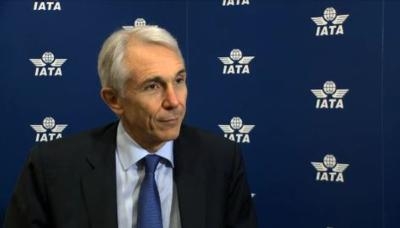Thu, Jun 06, 2013
Tyler: Governments Are 'Turning A Blind Eye To The Problems They Are Creating'
The International Air Transport Association (IATA) 69th Annual General Meeting (AGM) has unanimously endorsed a set of core principles for governments to consider when adopting consumer protection regulation. The IATA AGM resolution addresses a proliferation of uncoordinated and extra-territorial passenger rights legislation and regulation that is the cause of confusion among passengers. Some 50 countries have passenger rights requirements affecting air transport and several more are considering imposing them.

“Airlines are aligned with governments in wanting to get their passengers to their destinations on time. But sometimes that is just not possible. Governments should set some simple guarantees on what passengers should expect in such situations. But un-harmonized and extra-territorial regulations can cause utter confusion for international travelers. Being stuck in Europe on a disrupted trip from the United States to Israel is bad enough for a passenger. Regulation shouldn't worsen the situation by presenting them with a bewildering array of three conflicting passenger rights regimes,” said Tony Tyler, IATA’s Director General and CEO (pictured).
“Governments are turning a blind eye to the problems that they are creating. We want regulators to understand that travelers are our customers. And we want customers to have the best possible experience because our businesses depend on customers coming back. So, industry is providing a fresh solution. These core principles on consumer protection will help governments harmonize their various regimes. And they will be the centerpiece of an industry–wide campaign to help regulators recalibrate their impression of what the air travel experience is, and how it could be even better,” said Tyler.
In summary, the core principles call on governments to develop consumer protection regulations that:
- Are clear, unambiguous, aligned with international conventions, without extra-territorial implications and comparable with regimes in place for other modes of transport.
- Allow airlines the ability to differentiate themselves through their customer service offerings above a basic common standard.
- Ensure passenger access to Information concerning their rights, fares, including taxes and charges (prior to purchasing a ticket), the actual operator of the flight, and regular situational updates in the case of service disruptions.
“What’s needed is a Hippocratic Oath for regulators. The first principle would be to do no harm—intended or unintended. And every regulator should take an oath to solve problems, take full advantage of expert advice, measure costs against benefits and ensure global harmonization. The core principles are a first step,” said Tyler.
More News
Also: Centauri Aircraft Valkyrie, Meet the Admin, Night Airshow, Pelton Intv'w When we laid eyes on this critter, we fell in love… and then we learned the amazing story of t>[...]
Check out Blackshape in Oshkosh Display #190 Situated in the Apulian Aerospace district in Monopoli, Italy, Blackshape embodies the epitome of Italian craftsmanship, style, and qua>[...]
A Powerhouse In Aviation Safety Technology, Visit Alpha Systems AOA at Osh Display#3124-3125 Alpha systems AOA has been developing and integrating Angle of Attack systems for the l>[...]
High-Flying Models By PilotMall.com: Honoring Aviation's Legacy We are dedicated to preserving and celebrating our rich aviation heritage through stunning mahogany wood scale repli>[...]
CiES Has Pioneered Life Saving Technology Of Use To Pilots All Over The World... Booth 3119 CiES: CiES Inc. is the global leader in digital fuel quantity sensors for general aviati>[...]
 OSH25 Day Four Redux: Spirit SE-1!, H55 eFlyer, King Schools
OSH25 Day Four Redux: Spirit SE-1!, H55 eFlyer, King Schools ANN Thanks Our Speedy Sponsor... Blackshape!!!
ANN Thanks Our Speedy Sponsor... Blackshape!!! Alpha Systems AOA Guides ANN Oshkosh Coverage
Alpha Systems AOA Guides ANN Oshkosh Coverage Pilot Mall Intro's High Flying Models To ANN Sponsor Lineup
Pilot Mall Intro's High Flying Models To ANN Sponsor Lineup CiES Fuels ANN's Oshkosh 2025 Special Event Coverage
CiES Fuels ANN's Oshkosh 2025 Special Event Coverage



